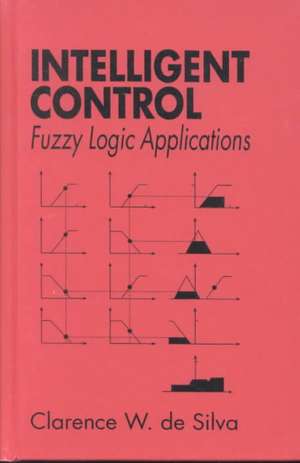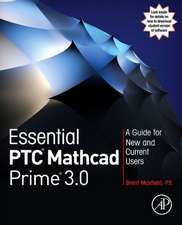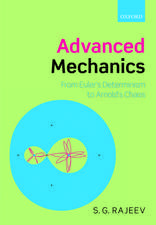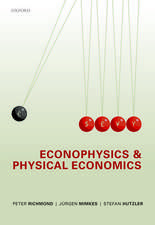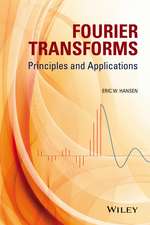Intelligent Control: Fuzzy Logic Applications
Autor Clarence W. de Silvaen Limba Engleză Hardback – 2 iun 1995
The author first introduces the traditional control techniques and contrasts them with intelligent control. He then presents several methods of representing and processing knowledge and introduces fuzzy logic as one such method. He highlights the advantages of fuzzy logic over other techniques, indicates its limitations, and describes in detail a hierarchical control structure appropriate for use in intelligent control systems. He introduces a variety of applications, most in the areas of robotics and mechatronics but with others including air conditioning and process/production control. One appendix provides discussion of some advanced analytical concepts of fuzzy logic, another describes a commercially available software system for developing fuzzy logic application.
Intelligent Control is filled with worked examples, exercises, problems, and references. No prior knowledge of the subject nor advanced mathematics are needed to comprehend much of the book, making it well-suited as a senior undergraduate or first-year graduate text and a convenient reference tool for practicing professionals.
Preț: 1400.87 lei
Preț vechi: 1751.09 lei
-20% Nou
Puncte Express: 2101
Preț estimativ în valută:
268.05€ • 280.62$ • 221.80£
268.05€ • 280.62$ • 221.80£
Carte tipărită la comandă
Livrare economică 05-19 aprilie
Preluare comenzi: 021 569.72.76
Specificații
ISBN-13: 9780849379826
ISBN-10: 0849379822
Pagini: 360
Ilustrații: 21 tables, 9 halftones and 258 equations
Dimensiuni: 156 x 234 x 25 mm
Greutate: 0.84 kg
Ediția:1
Editura: CRC Press
Colecția CRC Press
ISBN-10: 0849379822
Pagini: 360
Ilustrații: 21 tables, 9 halftones and 258 equations
Dimensiuni: 156 x 234 x 25 mm
Greutate: 0.84 kg
Ediția:1
Editura: CRC Press
Colecția CRC Press
Public țintă
UndergraduateCuprins
CONVENTIONAL AND INTELLIGENT CONTROL Introduction Conventional Control Techniques Summary Problems References KNOWLEDGE REPRESENTATION AND PROCESSING Introduction Knowledge and Intelligence Logic Semantic Networks Frames Production Systems Summary Problems References FUNDAMENTALS OF FUZZY LOGIC Introduction Fuzzy Sets Fuzzy Logic Operations Some Definitions Fuzzy Relations Composition and Inference Membership Function Estimation Summary Problems References FUZZY LOGIC CONTROL Introduction Basics of Fuzzy Control Decision Making with Crisp Measurements Defuzzification Architectures of Fuzzy Control Summary Problems References KNOWLEDGE-BASED TUNING Introduction Theoretical Background Analytical Framework Computational Efficiency Dynamic Switching of Fuzzy Resolution Illustrative Example Summary Problems References KNOWLEDGE-BASED CONTROL OF ROBOTS Introduction Robotic Control System Application to Robots In-Loop Direct Control High-Level Fuzzy Control Control Hierarchy System Development Servo Expert Development Summary Problems References SERVO MOTOR TUNING Introduction System Development Results Theory of Rule Base Decoupling Experimental Illustration Summary Problems References HIERARCHICAL FUZZY CONTROL Introduction General Concepts Hierarchical Model Effect of Information Processing Application in Process Control Summary Problems References INTELLIGENT RESTRUCTURING OF PRODUCTION SYSTEMS Introduction Theoretical Framework Implementation Using a Blackboard Architecture Case Study Summary Problems References FUTURE APPLICATIONS Introduction Intelligence in Automation Intelligent Multiagent Control Reconfigurable Autonomous Manipulators Intelligent Fusion of Sensors and Actuators Mechatronics Era Conclusion Problems References APPENDIX A: Further Topics on Fuzzy Logic APPENDIX B: Software Tools for Fuzzy Logic Applications Index
Recenzii
"de Silva's book excels as an introduction to the design and implementation of intelligent control systems based on fuzzy logic…a well-rounded and well-balanced blend of research results and industrial applications."
-F. Karray in IEEE Spectrum, October 1996
-F. Karray in IEEE Spectrum, October 1996
Descriere
The emergence of fuzzy logic and its applications has dramatically changed the face of industrial control engineering
